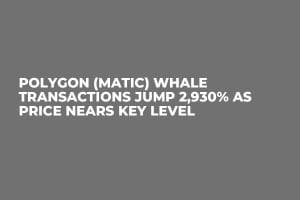
Disclaimer: The opinions expressed by our writers are their own and do not represent the views of U.Today. The financial and market information provided on U.Today is intended for informational purposes only. U.Today is not liable for any financial losses incurred while trading cryptocurrencies. Conduct your own research by contacting financial experts before making any investment decisions. We believe that all content is accurate as of the date of publication, but certain offers mentioned may no longer be available.
Polygon cofounder Sandeep Nailwal has shared details about POL, which he describes as a massive technical upgrade to the MATIC token.
According to Nailwal, POL provides the benefits of multi-chain staking without the additional risks associated with restaking.
POL is a massive technical upgrade to MATIC
POL delivers the benefits of multi-chain staking without the added risks of restaking. With the Polygon 2.0 proposal, the Polygon Ecosystem will expand from a single chain to an ecosystem of L2s that can easily interoperate and share…— Sandeep Nailwal | sandeep. polygon 💜 (@sandeepnailwal) August 28, 2023
He goes on to say that the Polygon ecosystem will be expanded from a single chain to an ecosystem of L2s that can easily interoperate with the Polygon 2.0 proposal.
POL is staked in the staking hub in Polygon 2.0. POL can be restaked to validate any number of chains on the network using an approach known as "enshrined restaking." POL may be used to stake any number of chains and play any number of roles natively.
POL would be a two-dimensional restaking innovation: enshrined restaking eliminates reliance on third parties, resulting in fewer vectors of centralization. POL can be used to protect more than just chains; it can also secure the Agg layer, DACs and other components.
POL was built from the ground up to be the first hyperproductive token and a third-generation token. Generation 1 is BTC, which provides no means for holders to play a role in network security. Generation 2 is ETH, which allows holders to stake to secure the network.
According to the Polygon Cofounder, POL is Generation 3, allowing holders to secure multiple networks and fulfill multiple roles.
POL a renaming of MATIC token
The POL proposal was released in mid-July. If the community agrees to go ahead with it, MATIC will be upgraded to POL in a 1:1 ratio. In practice, POL is an upgrade and renaming of the MATIC token. MATIC and POL would not and cannot coexist in terms of protocol; POL can only replace MATIC.
Conversion from MATIC to POL would be as simple as sending MATIC to the upgrading smart contract, which would instantly return the corresponding amount of POL.
Token holders would be given adequate time to upgrade, for example, four years or more if the proposal passes, although migration might begin within a few months.
Polygon cofounder Sandeep Nailwal stated in a response to a user that once the upgrade is approved by the governance, more details about the mechanism will emerge, although they will bear similarities to those shared in the POL proposal.



 Dan Burgin
Dan Burgin Vladislav Sopov
Vladislav Sopov